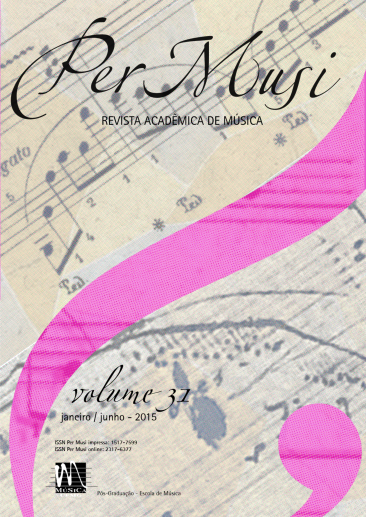Indeterminação na Expressão Anímica de Eunice Katunda
uma visão interpretativa
Palavras-chave:
Eunice Katunda, Inderterminação na Música, Análise musical e performance, Repertório brasileiro para piano soloResumo
Este trabalho tem como principal objetivo verificar os elementos de indeterminação empregados por Eunice Katunda na sua peça para piano Expressão Anímica, composta em 1979, assim como estudar os procedimentos composicionais adotados pela compositora e contribuir com os estudos sobre a música brasileira do século XX. A partir de parâmetros musicais – tempo, duração, altura e efeitos - é observado o emprego da indeterminação, assim como levantados os tipos de notação empregados - notação exata, aproximada, indicativa e gráficos musicais. A metodologia parte do estudo e análise da peça ao piano e do estudo da bibliografia específica sobre análise e notação. Serão feitas propostas para uma possível performance.
Referências
ANTUNES, Jorge. Notação na música contemporânea. Brasília: Sistrum,1989.
BRINDLE, Reginald Smith. The New Music: The Avant-Garde since 1945. New York: Oxford Press, 2003.
CAMPOS, Augusto de. Música de Invenção. São Paulo: Perspectiva,1998.
Correspondence Boulez-Cage. Paris: Christian Bourgeois,1991
EUNICE KATUNDA toca música contemporânea. Jornal A Tribuna, Santos, 27 de setembro de 1979.
KARKOSCHKA, Erhard. Notation in new Music. London: Universal Edition, 1972.
KATER, Carlos. Música Viva e J.H. Koellreutter: movimentos em direção à modernidade. São Paulo: Musa/Atravéz, 2001.
____________. Eunice Katunda: musicista brasileira. São Paulo: Anablume, 2001.
KOELLREUTTER, Hans Joachim. Terminologia de uma nova estética da música. Porto Alegre: Movimento, 1990.
KOSTKA, Stefan. Material and Techniques of Twentieth-Century Music.3rd ed. New Jersey: Prentice-Hall, 2006.
NEVES, José Maria. Música Contemporânea Brasileira. São Paulo: Ricordi, 1977.
O Estado de São Paulo. Para lembrar os autores do Manifesto Música Viva. São Paulo, 29 de setembro de 1978, p.18.
SOUZA, Iracele Vera Livero. Santoro: Uma História em Miniaturas: um estudo analítico-interpretativo dos Prelúdios para Piano de Claudio Santoro. 2003. 2v. 761 p. Dissertação (Mestrado), Instituto de Artes, Universidade Estadual de Campinas, 2003.
______. Louvação a Eunice: um estudo de análise da obra para piano de Eunice Katunda. Tese de Doutorado, Campinas, Instituto de Artes - UNICAMP, 2009.
SANTOS, Antonio Eduardo: Os Des-Caminhos do Festival Música Nova: (FMN-um veículo de comunicação dos caminhos da música contemporânea), 2003. Tese (Doutorado) Departamento de Comunicação e Semiótica, PUC-SP, São Paulo, 2003.
SIMMS, Bryan. Music of the Twentieth Century: Style and structure. NY: Schirmer, 1986.
ZAMPRONHA, Edson. Notação, Representação e Composição: um novo paradigma da escritura musical. São Paulo: Anablume/Fapesp, 2000.
Downloads
Publicado
Edição
Seção
Licença
Copyright (c) 2015 Per Musi

Este trabalho está licenciado sob uma licença Creative Commons Attribution 4.0 International License.

Exceto onde está indicado, o conteúdo neste site está sob uma Licença Creative Commons - Atribuição 4.0 Internacional.












